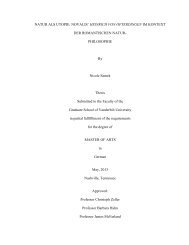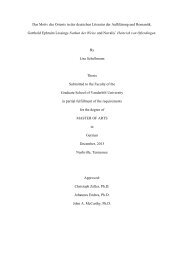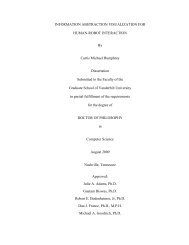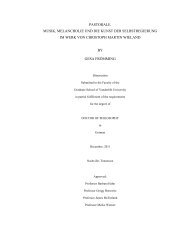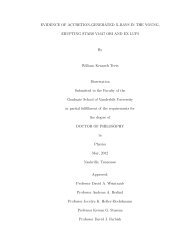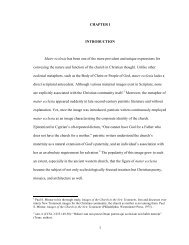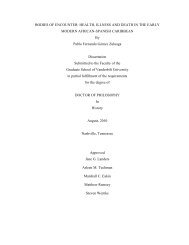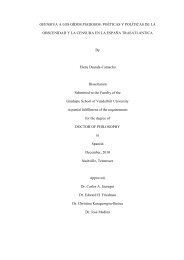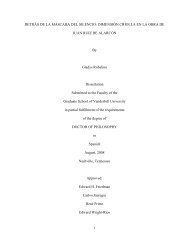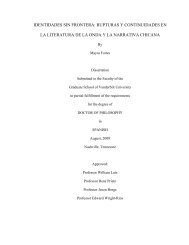- Page 1 and 2: A GENRE THEORY PERSPECTIVE ON DIGIT
- Page 3 and 4: ACKOWLEDGEMENTS Completing this dis
- Page 5 and 6: LIST OF FIGURES Figure Page 1. Iron
- Page 7 and 8: TABLE OF CONTENTS Page ACKOWLEDGEME
- Page 9 and 10: Scene One: At Sarah’s House......
- Page 11 and 12: CHAPTER I INTRODUCTION Background o
- Page 13 and 14: and media skills and knowledge to d
- Page 15 and 16: telling stories in social settings.
- Page 17 and 18: Brief Overview and Purpose of this
- Page 19 and 20: esearch attention, while working to
- Page 21 and 22: stories tend to be poignant, humoro
- Page 23 and 24: The conceptual precursor of digital
- Page 25 and 26: preserving memories, achieving pers
- Page 27 and 28: These properties have given momentu
- Page 29 and 30: The multimodal semioticians For the
- Page 31: students are exposed to in formal l
- Page 35 and 36: Also, the media affords easy creati
- Page 37 and 38: epresenting themselves that are oth
- Page 39 and 40: institutionally endorsed nature of
- Page 41 and 42: conceptualized as a pedagogical too
- Page 43 and 44: oth in form and content, personal v
- Page 45 and 46: Nixon, 2003), and how literacies co
- Page 47 and 48: esearcher is solely concerned with
- Page 49 and 50: concert with the individual to move
- Page 51 and 52: discourses, persons, tools, activit
- Page 53 and 54: also operate from a conception of s
- Page 55 and 56: ways of using tools, and typical wa
- Page 57 and 58: (healing from disease and loss), di
- Page 59 and 60: The important idea for my enterpris
- Page 61 and 62: other instances of using language,
- Page 63 and 64: cognitive activities, which serve a
- Page 65 and 66: executives, who may resort to perso
- Page 67 and 68: members to interpret their past exp
- Page 69 and 70: collaborative work of partners. Fin
- Page 71 and 72: Genre as meaning potential In the p
- Page 73 and 74: is Bakhtin’s view that a particul
- Page 75 and 76: accumulated experiential and ideolo
- Page 77 and 78: with genres functioning to maintain
- Page 79 and 80: as one of many active agents of the
- Page 81 and 82: overlapping and mobile. Because gen
- Page 83 and 84:
ut from creative integration of a v
- Page 85 and 86:
temporarily foregrounds and backgro
- Page 87 and 88:
We speak only in definite speech ge
- Page 89 and 90:
To do a genre-formed analysis of di
- Page 91 and 92:
the implications of this research f
- Page 93 and 94:
data to illustrate the analytical m
- Page 95 and 96:
ways in which the meaning potential
- Page 97 and 98:
For the purpose of this study, I di
- Page 99 and 100:
connecting with its audience. Durin
- Page 101 and 102:
storytelling as an act of civic eng
- Page 103 and 104:
Youth 10 movement, the Finding A Vo
- Page 105 and 106:
According to Joe, the inherent simp
- Page 107 and 108:
patients create stories that were u
- Page 109 and 110:
pedagogical materials and publicati
- Page 111 and 112:
Table 1. Digital Story Corpus Story
- Page 113 and 114:
Selection of focal stories A genre-
- Page 115 and 116:
facilitator interview protocol to g
- Page 117 and 118:
able to schedule a Skype session wi
- Page 119 and 120:
Data Analysis Analysis of the data
- Page 121 and 122:
Table 4. Prompt Questions for Genre
- Page 123 and 124:
window through which the author sho
- Page 125 and 126:
story. Namely, he breaks down a sto
- Page 127 and 128:
couplings can only emerge when they
- Page 129 and 130:
a theme—a new understanding of hi
- Page 131 and 132:
econtextualized and reappropriated
- Page 133 and 134:
An example: Temporal visual model o
- Page 135 and 136:
allows me to get at the basic theme
- Page 137 and 138:
amount of details developing the mo
- Page 139 and 140:
epresents a stanza that is analytic
- Page 141 and 142:
Table 6. A List of Multimodal and D
- Page 143 and 144:
That is, the sudden visual “rises
- Page 145 and 146:
In making these arguments about gen
- Page 147 and 148:
trends, themes, and values that can
- Page 149 and 150:
to the unique expressive, democrati
- Page 151 and 152:
Convergence. The genre-informed fra
- Page 153 and 154:
that are at times incongruous with
- Page 155 and 156:
vision, digital storytelling is val
- Page 157 and 158:
participants are expected to arrive
- Page 159 and 160:
combined, as dialectically connecte
- Page 161 and 162:
assurance of privacy, as manifested
- Page 163 and 164:
a particular experience. One of the
- Page 165 and 166:
On the other hand, the tenet of “
- Page 167 and 168:
ambitious.” Essentially, the work
- Page 169 and 170:
persons (and their social relations
- Page 171 and 172:
The workshop model In this section,
- Page 173 and 174:
process, scripting involves further
- Page 175 and 176:
elements. For example, “owning yo
- Page 177 and 178:
that they always show Tanya to illu
- Page 179 and 180:
structure created by the author. Wi
- Page 181 and 182:
identify. I present each juncture o
- Page 183 and 184:
The narrative begins with an unprov
- Page 185 and 186:
conjunction of two types of non-lin
- Page 187 and 188:
emotions found in the narrative. Wh
- Page 189 and 190:
defined by the CDS, involves explor
- Page 191 and 192:
Vignette Two: The Trip Visual Effec
- Page 193 and 194:
Vignette Three: The Photos Visual E
- Page 195 and 196:
In the final sequence of the story,
- Page 197 and 198:
and described. I will draw on these
- Page 199 and 200:
Closely related to these thematic f
- Page 201 and 202:
healing and growth have partially g
- Page 203 and 204:
CHAPTER V STORIES ABOUT WALES, BY W
- Page 205 and 206:
at a staff meeting at the BBC. Acco
- Page 207 and 208:
Vignettes of mundane experiences In
- Page 209 and 210:
When I invited Cathy to speak about
- Page 211 and 212:
accomplish this, Capture Wales work
- Page 213 and 214:
seeing beyond the stories and “kn
- Page 215 and 216:
This principle of cultural democrac
- Page 217 and 218:
elationship with media content. In
- Page 219 and 220:
son]—‘What is heaven? Why do yo
- Page 221 and 222:
As I have discussed in the previous
- Page 223 and 224:
Safeguard participant privacy and w
- Page 225 and 226:
From a genre perspective, Cathy’s
- Page 227 and 228:
In other cases, the clashing of two
- Page 229 and 230:
Capture Wales stories do we hear st
- Page 231 and 232:
filled with tensions. In this case,
- Page 233 and 234:
according to individual availabilit
- Page 235 and 236:
lightness in seemingly mundane stor
- Page 237 and 238:
discovery through the revelation of
- Page 239 and 240:
This story is exemplary of the wide
- Page 241 and 242:
sounds, sights, and activities. The
- Page 243 and 244:
Scene Two: Arriving at the Pub Visu
- Page 245 and 246:
Capture Wales workshops focused on
- Page 247 and 248:
allowing the storyteller to tempora
- Page 249 and 250:
onlookers sitting at a table, heads
- Page 251 and 252:
yellow vomit of chicken and rice, w
- Page 253 and 254:
warming friendship. So do the words
- Page 255 and 256:
Figure 20: A Night at Ducks and Dog
- Page 257 and 258:
given theme. In a chronologically o
- Page 259 and 260:
Lastly, Rhiannon’s story well ill
- Page 261 and 262:
themselves and becoming friends; we
- Page 263 and 264:
Chapter VI STORIES FOR CHANGE In th
- Page 265 and 266:
Enabling Positive Social Change To
- Page 267 and 268:
off guard with overwhelming emotion
- Page 269 and 270:
coherent with the institutional con
- Page 271 and 272:
fully realized. In this instance, P
- Page 273 and 274:
In these instances of genre invocat
- Page 275 and 276:
egulated discursive activities. Eme
- Page 277 and 278:
Aside from such physical attributes
- Page 279 and 280:
of their issues. Our counselors sai
- Page 281 and 282:
the story—an independent woman’
- Page 283 and 284:
disease, actively dismantles the em
- Page 285 and 286:
Speaking in light of these painful
- Page 287 and 288:
for the help her husband has provid
- Page 289 and 290:
effort to provide help on matters o
- Page 291 and 292:
persistent support and companionshi
- Page 293 and 294:
y medical staff and poor quality of
- Page 295 and 296:
of the broader reflective and analy
- Page 297 and 298:
meaning potential, we come to atten
- Page 299 and 300:
CHAPTER VII DISCUSSION At the begin
- Page 301 and 302:
see, increasingly clearly, how diff
- Page 303 and 304:
stories, encoding the ideology of t
- Page 305 and 306:
consecutive morning classes on Frid
- Page 307 and 308:
ing a wealth of skills, mindsets an
- Page 309 and 310:
with my colleagues, while at other
- Page 311 and 312:
composition task for local pedagogi
- Page 313 and 314:
vise versa. Kay, for example, point
- Page 315 and 316:
Future Directions for Research A Ge
- Page 317 and 318:
situated creative intentions are co
- Page 319 and 320:
In pursuing the second question, I
- Page 321 and 322:
Appendix A. Recruitment Letter Dear
- Page 323 and 324:
questions in an email. Here are exa
- Page 325 and 326:
6. What knowledge and expertise (te
- Page 327 and 328:
n_01.shtml http://www.bbc.co.uk/wal
- Page 329 and 330:
Appendix E. Typology of Digital Sto
- Page 331 and 332:
Rituals (CDS) Tanya (CDS) The gift
- Page 333 and 334:
REFERENCES Atchley, D. (Producer).
- Page 335 and 336:
Dalton, B., & Smith, B. E. (2012).
- Page 337 and 338:
Kamberelis, G. (1995). Genre as ins
- Page 339 and 340:
Nystrand, V. A. D. (1994). A genre
- Page 341:
Vasudevan, L., DeJaynes, T., & Schm



